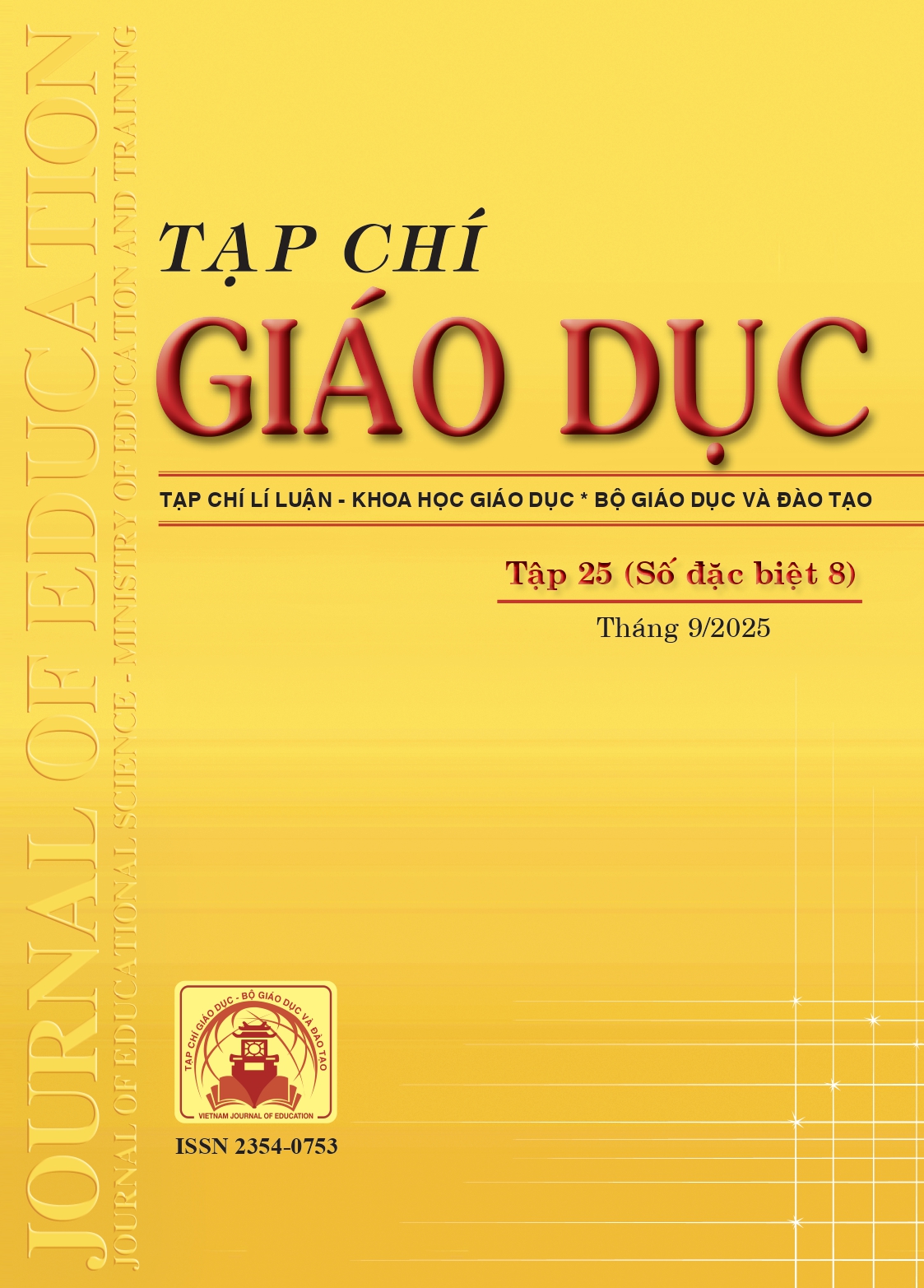Phát triển năng lực số cho học sinh lớp 9 thông qua tổ chức dạy học kết hợp trong môn Khoa học tự nhiên
Tóm tắt
In the context of the ongoing digital transformation in education, developing students’ digital competence has become a strategic priority for general education. This study aims to propose and implement a blended learning model to enhance digital competence among lower secondary school students through the Grade 9 Natural Science curriculum. The research draws on established digital competence frameworks from the European Commission (DigComp 2.2), UNESCO, and the Vietnamese Ministry of Education and Training (2025). A three-phase instructional design was developed, consisting of pre-class preparation (online), in-class instruction (face-to-face), and post-class consolidation and extension (face-to-face). Within this structure, various digital learning tools such as Google Classroom, PhET simulations, and SCORM-based e-learning content were integrated. The model was trialed in a lesson on light refraction and total internal reflection with 41 ninth-graders. Results show that students not only acquired scientific knowledge effectively but also demonstrated increased proficiency in digital skills including online collaboration, digital safety, and content creation. The study concludes that blended learning is a promising pedagogical approach to systematically foster digital competence in secondary science education.
Tài liệu tham khảo
Allen, I. E., & Seaman, J. (2010). Class differences: Online education in the United States, 2010. Sloan Consortium (NJ1).
Bộ GD-ĐT (2018). Chương trình giáo dục phổ thông 2018 môn Khoa học tự nhiên (ban hành kèm theo Thông tư số 32/2018/TT-BGDĐT ngày 26/12/2018 của Bộ trưởng Bộ GD-ĐT).
Đỗ Văn Hùng, Trần Đức Hòa, Nguyễn Thị Kim Dung, Bùi Thanh Thủy, Nguyễn Thị Kim Lân, Đào Minh Quân, Đồng Đức Hùng, Bùi Thị Ánh Tuyết, Bùi Thị Thanh Huyền, Trần Thị Thanh Vân, Trịnh Khánh Vân (2022). Năng lực số Digital Literacy. NXB Đại học Quốc gia Hà Nội.
Garrison, D. R., & Kanuka, H. (2004). Blended learning: Uncovering its transformative potential in higher education. The internet and higher education, 7(2), 95-105. https://doi.org/10.1016/j.iheduc.2004.02.001
Graham, C. R. (2006). Blended learning systems. The handbook of blended learning: Global Perspectives, Local Designs, 1, 3-21.
Horn, M. B., & Staker, H. (2014). Blended: Using disruptive innovation to improve schools. John Wiley & Sons.
Kiều Thu Linh, Trần Mỹ Ngọc, Đặng Thị Thu Huệ, Đoàn Thị Thúy Hạnh, Trần Bích Hằng, Phan Thị Thu, Lê Quỳnh Như (2024). Kinh nghiệm quốc tế về xây dựng kế hoạch bài dạy theo mô hình dạy học kết hợp và đề xuất cho Việt Nam. Tạp chí Khoa học Giáo dục Việt Nam, 20(01), 73-80.
Law, N., Woo, D., & Wong, G. (2018). A Global Framework of Reference on Digital Literacy Skills for Indicator 4.4.2. UNESCO Institute for Statistics.
Lê Anh Vinh, Bùi Diệu Quỳnh, Đỗ Đức Lân, Đào Thái Lai, Tạ Ngọc Trí (2021). Xây dựng khung năng lực số cho học sinh phổ thông Việt Nam. Tạp chí Khoa học Giáo dục Việt Nam, số đặc biệt tháng 1, 1-11.
Le, T. H., & Tran, H. S. (2024). Using Blended Learning with eduAI to Improve Vietnamese University Students' Learning Experiences. Journal of Advances in Sports and Physical Education, 7(4), 59-66. https://doi.org/10.36348/jaspe.2024.v07i04.001
Nguyễn Thị Xiêm (2023). Một số vấn đề về khung năng lực số cho học sinh trung học phổ thông trong Chương trình giáo dục phổ thông 2018. Tạp chí Giáo dục, 23(02), 12-18.
Phạm Thị Phương Nam, Lê Thị Phượng (2022). Áp dụng mô hình dạy học kết hợp để phát triển năng lực số cho học sinh trong dạy học chủ đề Tế bào, Khoa học tự nhiên 6. Báo cáo khoa học về nghiên cứu và giảng dạy Sinh học ở Việt Nam - Hội nghị Khoa học Quốc gia lần thứ 5, 897-907. https://doi.org/10.15625/vap.2022.0100
The European Councils (2006). Recommendation of the European Parliament and of the council of 18 December 2006 on key competences for lifelong learning. (p. 15). Official Journal of the European Union.
Tran, T. M. L. (2024). Blended learning in EFL classrooms at a Vietnamese university from students’ perspectives. International Journal of TESOL & Education, 4(2), 99-117. https://doi.org/10.54855/ijte.24426
Vuorikari, R., Kluzer, S., & Punie, Y. (2022). DigComp 2.2: The Digital Competence Framework for Citizens-With new examples of knowledge, skills and attitudes. Publications Office of the European Union.
Đã Xuất bản
Cách trích dẫn
Số
Chuyên mục
Giấy phép

Tác phẩm này được cấp phép theo Ghi nhận tác giả của Creative Commons Giấy phép quốc tế 4.0 .












